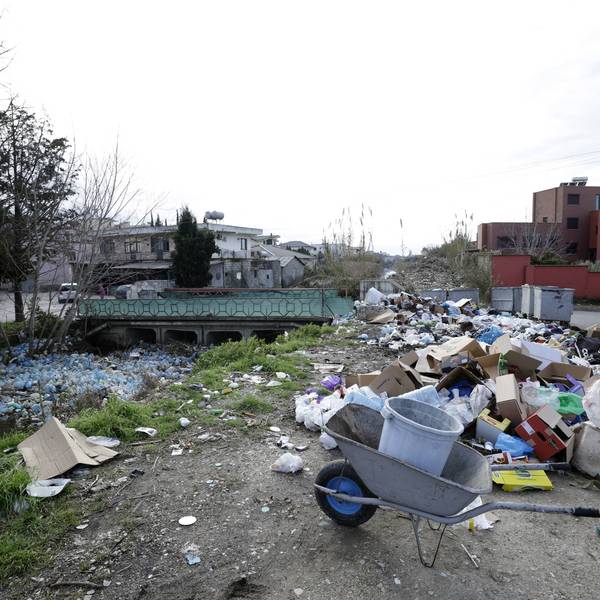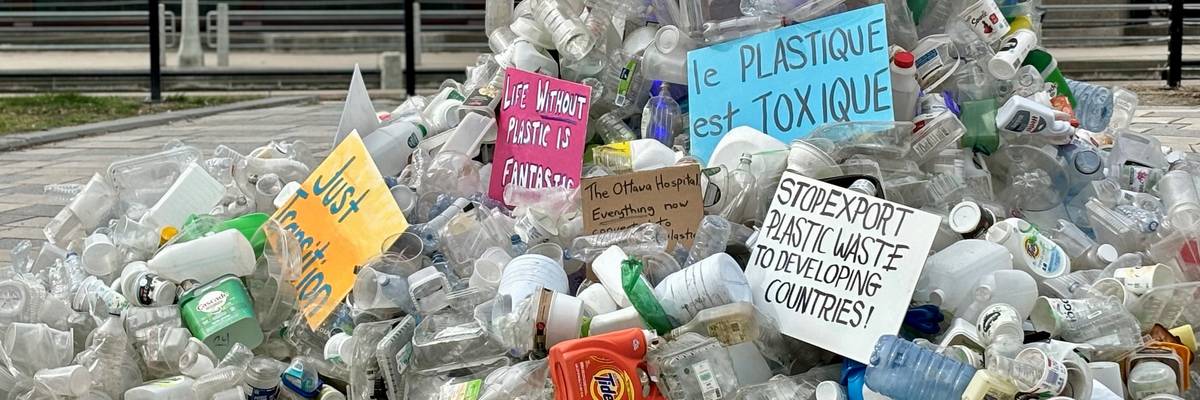The fourth and second-to-last round of negotiations for a Global Plastics Treaty concluded Tuesday with what campaigners called a "weak" and "disappointing" compromise, as countries did not agree to discuss curbing primary plastic production before the final session later this year.
The "underwhelming" result came at the close of talks in Ottawa, Canada, at which 196 fossil fuel or chemical industry lobbyists attended, a 37% increase from the third round of negotiations and more than the entire delegation of the European Union.
"People are being harmed by plastic production every day, but states are listening more closely to petrochemical lobbyists than health scientists," Graham Forbes, Greenpeace's head of delegation to the negotiations and Greenpeace USA's global plastics campaign lead, said in a statement. "Any child can see that we cannot solve the plastic crisis unless we stop making so much plastic."
"The Global South countries who are fighting tooth and nail for a strong plastics treaty have been steamrolled by the will of wealthy nations."
Civil society and frontline groups called reducing plastics production a "nonnegotiable" component of the treaty heading into the fourth session of the intergovernmental negotiating committee to advance a plastics treaty (INC-4), the continuation of a process launched at a United Nations Environment Assembly (UNEA) in Nairobi in 2022. However, when delegates agreed at the end of the latest negotiations to continue discussions of certain issues in "intersessional" work, this did not include a discussion of primary plastic polymers.
"From the beginning of negotiations, we have known that we need to cut plastic production to adopt a treaty that lives up to the promise envisioned at UNEA two years ago," said David Azoulay, the director of environmental health at the Center for International Environmental Law (CIEL). "In Ottawa, we saw many countries rightly assert that it is important for the treaty to address production of primary plastic polymers. But when the time came to go beyond issuing empty declarations and fight for work to support the development of an effective intersessional program, we saw the same developed member states who claim to be leading the world toward a world free from plastic pollution, abandon all pretense as soon as the biggest polluters look sideways at them."
The negotiations, which began April 23, were pulled between more ambitious countries—particularly Global South countries in Africa, Latin American, and the Pacific Islands—and the so-called "Like-Minded Group" of fossil fuel and polymer producing countries such as Saudi Arabia, Russia, China, Kuwait, Qatar, and India. On the more ambitious side of the spectrum, Rwanda and Peru spearheaded a call for intersessional work on a plan to cut production of primary polymers by 40% of 2025 levels by 2040, which was backed by Malawi, the Philippines, and Fiji.
"While not high enough to avoid breaching the 1.5°C climate target, Rwanda and Peru's proposal is the first time a group of countries have put forward a specific target for plastic production cuts," environmental coalition GAIA said in a statement.
Another promising development was the Bridge to Busan Declaration on Primary Plastic Polymers, in which signatories promised to work toward maintaining a plastic production reduction commitment in line with the Paris agreement in the final treaty text, to be set in Busan, South Korea, at the end of 2024.
On the other hand, Break Free From Plastics said that some countries had obstructed the process by pressuring negotiators to agree to consensus, even though the procedure allows for voting when consensus cannot be reached. They also interfered with the drafting of the treaty itself.
"A small number of countries continued their obstructionist and low-ambition tactics—watering down, adding countless brackets, and shamelessly twisting the language across the different provisions in an attempt to narrow the scope and lower the ambitions of the treaty," the group said.
However, GAIA said that negotiations did make progress on a draft treaty text that included a reduction of plastic production, the banning of toxic chemical additives, a financial mechanism to help countries meet targets, and a commitment to a just transition. After this progress, the chair's proposal that intersession work would not consider polymers came as a surprise.
"Tonight's upsets show that historical injustices have made their way into the halls of the plastics treaty negotiations," Camila Aguilera, communications officer for GAIA Latin America and the Caribbean, said in a statement. "The Global South countries who are fighting tooth and nail for a strong plastics treaty have been steamrolled by the will of wealthy nations. The debate over intersessional work is a proxy for these geopolitical divides between the Global North and the Global South."
CIEL said that several countries in the self-described "High Ambition Coalition," (HAC) including the European Union, had not pushed back sufficiently on attempts to weaken the treaty and the process. It, along with many other environmental groups, also criticized the United States, which is not an HAC member, for failing to stand up for an ambitious treaty.
"Negotiating with the U.S. and other oil states has felt like trying to negotiate with industry, always prioritizing profit over the well-being of people and the planet."
"The United States needs to stop pretending to be a leader and own the failure it has created here," said CIEL President Carroll Muffett. "When the world's biggest exporter of oil and gas, and one of the biggest architects of the plastic expansion, says that it will ignore plastic production at the expense of the health, rights, and lives of its own people, the world listens. Even as the U.S. signaled to the G7 that it would commit to reduce plastic production, it intentionally blocked efforts to do that in the global talks most relevant to the issue. It's time to ask whether the U.S. delegation to the plastics treaty simply missed the memo on protecting health and human rights from the plastic threat, or whether the Biden administration forgot to send it."
Center for Biological Diversity senior attorney Julie Teel Simmonds said that "rather than showing leadership, the United States has remained disappointedly in the middle."
"The U.S. proposals lack binding targets and focus on cutting demand for plastic rather than production itself," Simmonds continued. "And they don't go beyond existing U.S. policy, which has failed to curb plastic production or protect frontline communities and the environment from harm."
Frankie Orona, the executive director of the Society of Native Nations, recounted that "negotiating with the U.S. and other oil states has felt like trying to negotiate with industry, always prioritizing profit over the well-being of people and the planet."
On the final day of negotiations, Break Free From Plastics published a statement calling out the U.S. for not committing to legally binding plastic production cut targets, underselling its own regulatory apparatus, and overemphasizing recycling.
"As the world's largest consumer and exporter of plastic waste, purporting to recognize the severity of the crisis, the U.S. must act decisively on these imperatives rather than negotiating an ineffective treaty that will sacrifice the public health and human rights of all to the interests of the fossil fuel and petrochemical industries," the group said.
It demanded that the U.S. delegation support a legally binding treaty that includes set global targets; production caps, phaseouts, and phasedowns for plastic polymers; the health-based control of toxic chemicals in production; a just transition for all communites impacted by the plastics lifecycle; and waste management that protects health and the environment and rejects false solutions.
Civil society groups also argued that negotiators should heed the demands of Indigenous peoples, and that they should be given more resources and support to participate. However, CIEL found that plastics lobbyists outnumbered the 28 representatives of the Indigenous Peoples Caucus by a rate of seven to one.
"We need intersessional work with the inclusion of Indigenous Peoples—who are rights holders with traditional knowledge and a deep understanding of sustainable resource management—as well as frontline and fenceline communities—who, for generations, have borne the brunt of environmental damage from fossil fuels and petrochemical production," Orona said. "By including these often-marginalized groups, we can move beyond 'business as usual' to achieve an ambitious treaty that protects our environment, respects human rights, and fosters a more equitable and sustainable future for all of us and Mother Earth."
Green groups also called for conflict-of-interest policies to reduce the role of industry lobbyists.
"Despite mounting proof of plastics' enormous harm to people and the planet, the petrochemical industry and the countries that put them first are ramping up efforts to water down this treaty," Teel Simmonds said. "We'll keep fighting their deception and obstruction because the world desperately needs a treaty that protects us from plastic production and pollution. And we'll keep pushing the United States to lead."
The next and last round of negotiations is set to begin on November 25. In the meantime, intersessional work will move forward on a financial mechanism, plastic products, chemicals of concern in plastic products, product design, reusability, and recyclability. Observers will be able to contribute to these sessions, while another group conducts a legal review of the treaty.
"The success of the International Plastics Treaty depends on the reduction of primary plastic polymers," said Yu Hyein from the Korea Federation for Environmental Movements and Friends of the Earth, South Korea. "There was not enough discussion on this at INC-4, and it is likely that this will continue at INC-5. As a host country and a member of the High Ambition Coalition, the Korean government should make an ambitious declaration on reducing primary plastic polymers."
Greenpeace's Forbes added, "The entire world is watching, and if countries, particularly in the so-called 'High Ambition Coalition,' don't act between now and INC-5 in Busan, the treaty they are likely to get is one that could have been written by ExxonMobil and their acolytes."




